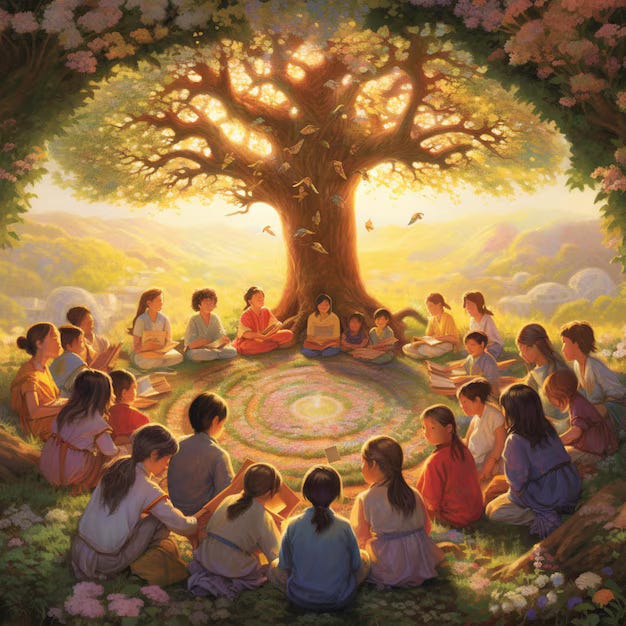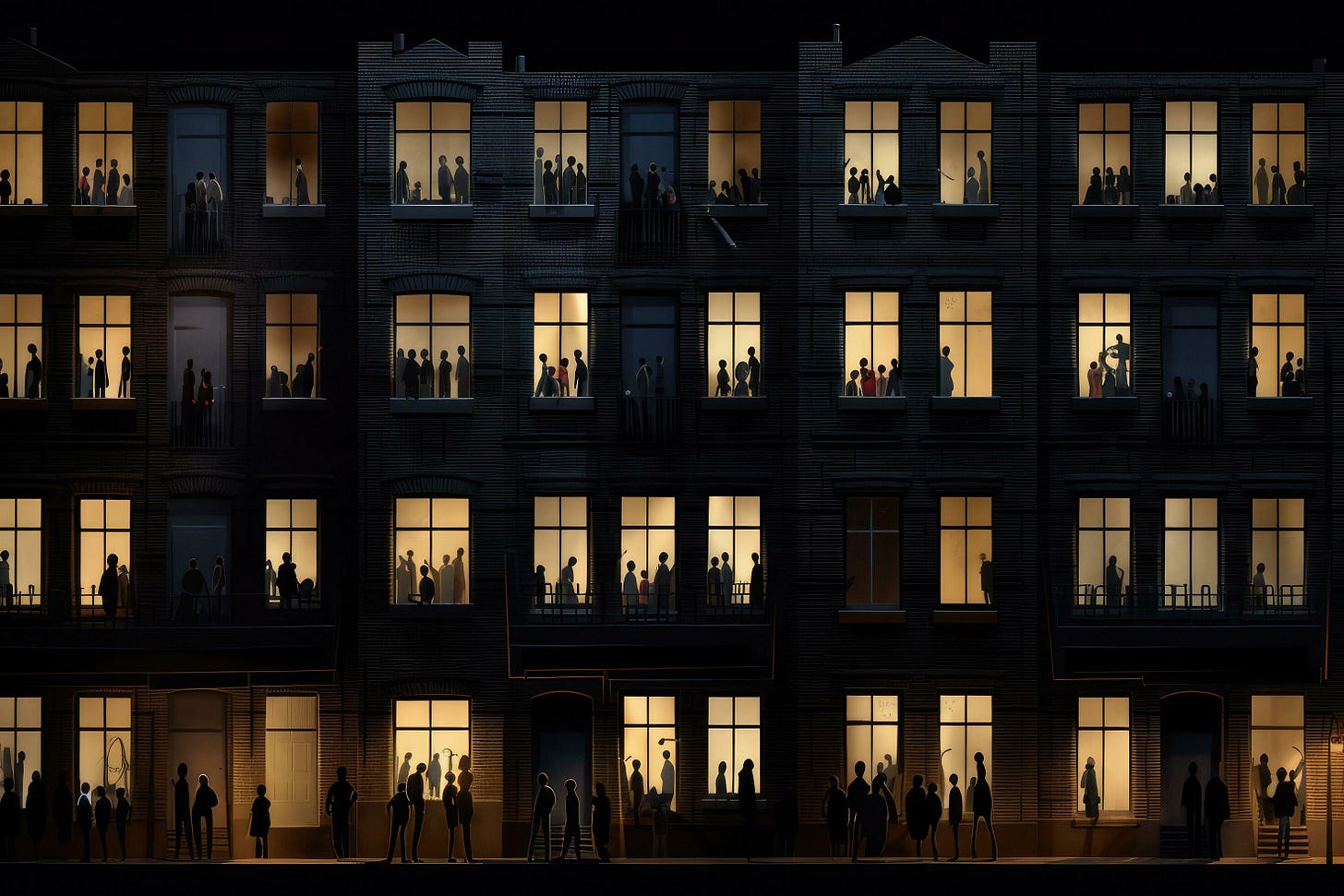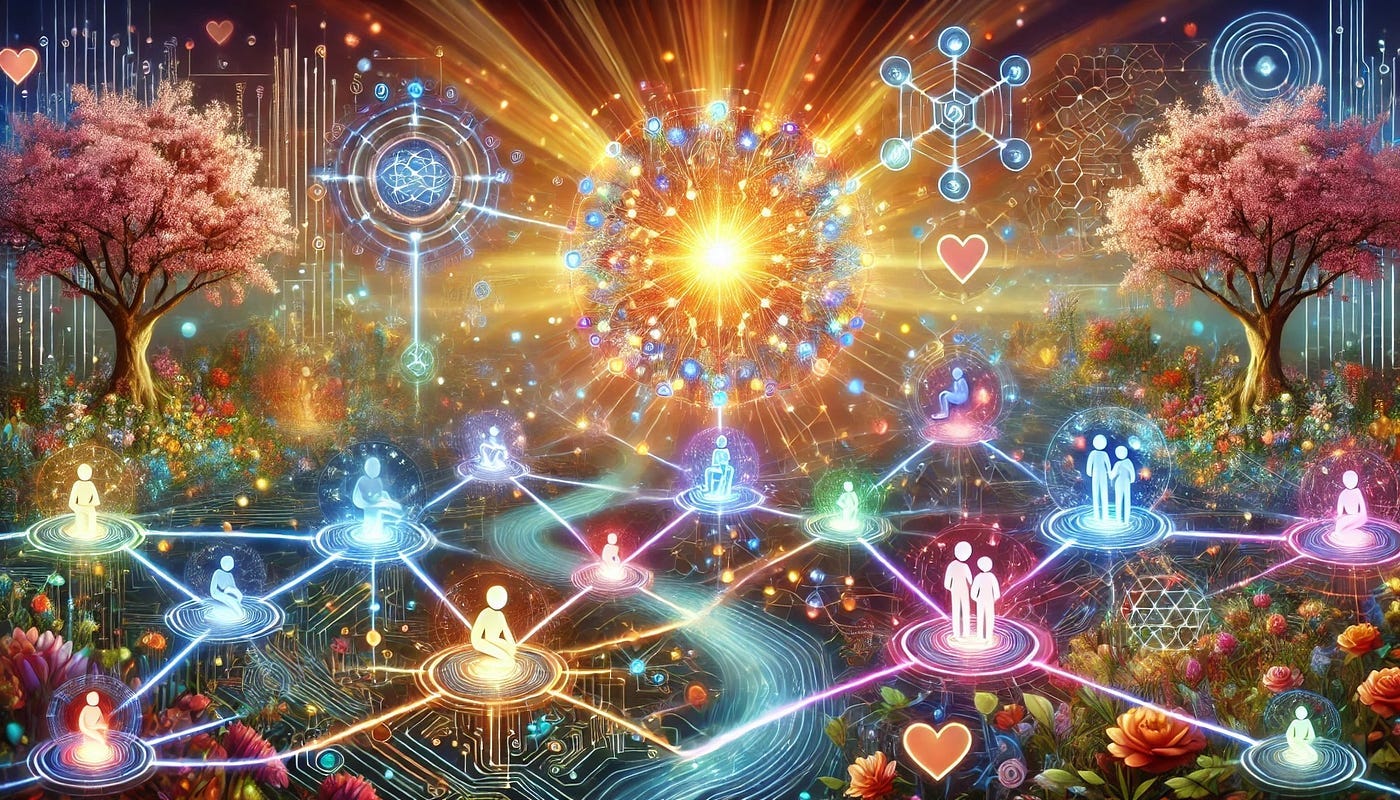Is there anything more important than building community in today’s world with the loneliness epidemic?
One of the great tragedies of our day is how humanity’s usual evolutionary social structure of tribal belonging has deteriorated to a devastating degree and the average person experiences a fair amount of isolation. The feeling of having to tread through life’s highs and lows alone is quite excruciating. And that in itself can be the cause of a sustained ‘low.’ It can be extremely damaging and confusing to the human nervous system to not have high quality relationships with other humans who are there to care and to listen and to share. To know and feel known. To deeply and intimately co-experience the journey of this dimension together.
Even if the percentage of lonely people was 1% that would be unacceptable but that fact that it is as high as it is is fucking crazy considering we are one the most social species on the planet. True belonging is ubiquitously craved and yet it seems that even with the recognition of this, the currents of our culture continue to drive us further into separation.
The social fabric of our society funnels people into isolated zoo cages and gives them devices that make them addicted to a virtual world that makes them anxious to interact with the real world. With the advancing of technology, especially AI, it is very scary to imagine what it might portend for the future of humanity’s social state. How many humans will have AI friends instead of other humans?
As humans, we study ourselves and have clearly found that the degree to which you belong is causal to your level of happiness and health. When you are lonely your mental/emotional/physical health will plumet. And vice versa when you are a part of a group with deep shared identity that provides a sense of collective purpose then you are generally more fulfilled, happy, and healthy. Being in a solid network of relationships makes you far less prone to depression and creates resilience towards life’s guaranteed challenges. Having others to sit with you in the mud is exponentially better than facing things alone. Not to mention when you are lonely, the loneliness itself becomes the challenge that causes suffering.
The modern world loves to label so many different things as communities. What is called community is usually just a superficial group of people that participate in the same activity or event. There is no guarantee of socially interacting with others. It is totally possible to not speak to a single other person and not feel connected to the group of people, yet still be labeled a community. This is maybe your local corporate yoga studio, or chess club, or fitness club. These types of communities usually lack the felt sense of being amongst a group of people who truly know you in your joy, struggle, and authenticity. People who really know the depth of your story.
Even if you have an abundance of loose association social connections but are starved of the deeper intimate relationships, then the belonging shaped hole in your soul will persist. And much of our culture is limited to adequate intimacy with only one person - a romantic partner opposed to intimacy amongst a whole tribe of people which is what our ancestors were used to.
So there’s the
1. Surface level community (stated above).
Then there’s
2. The community that nourishes but doesn’t last
This is the festival or retreat type of experience that can deliver on fulfilling needs of being seen and feeling known, but of course as soon as the course ends, so does the sense of community. These experiences grant an environment where you feel safe to express your authenticity and are received for it, BUT always inevitably come to an end followed by a return to the matrix of isolation. These pop up communities can offer genuine healing and belonging but are unsustainable because we have to continue to operate in the “real world” to fund the pop up communities. The “real world” or matrix is more sustainable (relatively), but at the expense of a social sphere that is fragmented. The festival/retreat/camp lifestyle informs community oriented activity on the daily, the conditions of ordinary-mainstream-city life make it hard to sustain a lifestyle that includes adequate belonging.
An important insight:
The most important place to have community is the place you call home. No matter how much social connection you experience out in the world, if the home you return to at the end of the day doesn’t include community then you will feel lonely.
The feeling of coming home to a group of humans who share the space is a deeply human experience that nourishes the nervous system.
Anyone who has experienced some form of communal living has felt the profound nourishment of it. (Not to say it doesn’t come with its challenges) The healthy comfort of sharing a habitat with others and having shared common areas cannot be understated as critical to satiating our need to belong. Things like sharing meals, and co-maintaining the land provide a shared space that you both can identify with. A shared land that tethers you both to a shared identity. Having that 3rd external factor that binds the relationship network is really what makes us feel an adequate level of belonging. It is the difference between feeling like potted plants vs being trees who’s root are sharing the same soil.
The idea of ‘primitive communism’ says that at a small scale there could be a baseline of care that all humans receive. Communism here isn’t defined as property regime at a macro scale, but rather ethos of “from each according to their abilities, to each according to their needs” at a local scale. This means people learning to fit in to a system in a way where their strengths can best be utilized and their weaknesses can be best tended to. This is usually only reserved for environments like Burning Man. I know communism is a trigger word but try to disassociate from stigmatized definition and look more at a recontextualized literal definition that is presented in the idea here.
So really what I am arguing is that we need the things that meet our basic needs to involve collaboration with others in a way that creates the felt sense of interdependence.
A shared habitat creates a reason to be invested in each other because when you perceive that you are parts of the same whole, it is common sense that the parts take care of each other. This comes from an innate understanding that the health of the whole is limited by the quality of relationships between the parts.
It is really heart-breaking that there are so many lost souls who are dealt a fucked hand at life and are wandering about the world homeless without anyone willing to help them. It has become normal to ignore these types of people, and even other people in need of help. After all we are all only one person, what can we do anyways? And we ourselves are busy with our own problems, and have necessary work to get to to pay the bills etc. We figured that someone else will help them anyways.
One time I walked past a homeless dude who was past out on the sidewalk, he didn’t look good at all. I honestly was worried of social judgment from strangers if they saw me try to help him, but I persisted and took a closer look at him. Luckily there was a guy in his RV parked right there who asked me “hey is that guy alright” we then both took on the task of consoling the guy passed out and called an ambulance. My best guess was he drank too much. The experience of helping him made me feel alive and grateful. The sad part about it was witnessing the paramedics’ attitudes when they arrived. They clearly didn’t care about him as a fellow human. They were rude and saw him as a nuisance. Humans need love and care, not just sterile physical assistance. It made me feel helpless as to how to actually help this guy in the long term. I am only one person.
There’s something about the culture of individualism that allows for stray humans to not receive the help that every humans deserves in this ‘every man for themselves’ type of society. And the corrupt social system of our government clearly isn’t adequate in helping people to find a path to a healthy living situation.
I really believe if the prevailing social structure of society was one of operating in collaboration on a local scale, then it would dramatically mitigate the amount of humans who feel forgotten about and left to fend for themselves. If we grew up and were taught how to live together; inherited a lifestyle that involved collective stewardship of land then we would have the context to much better integrate lonely stragglers.
So then…Why does it seem that belonging is incompatible with our current society?
The way in which we meet our basic needs and satisfy consumerist culture happens to drive humans into isolation. Our neoliberal capitalist mega machine seeks to be able to commodify everything and turn it into a product/service that is mediated by the global market instead of . It optimizes for a society of isolated consumers that are all dependent on the system at large because this is what benefits it the most. At the expense of what though? Quite literally the thing that makes life worth living - relationships.
Our cultural definition of progress has been economic material growth that aims at making life more comfortable. It has backfired and made us very uncomfortable. This ideology has brought about not only the possibility, but the default path of maturing into an adult that lives in their own apartment and learns to take care of their own needs from home without the need of anyone else. Can you see how this is a massive dilemma given the fact that our nature is to survive/thrive in the foundational context of belonging.
We live in a system that defines human being as buyers and sellers. This is severely reductionistic. It sees competition as more fundamental than cooperation. We are constrained to a system that inaccurately models life in terms of what human beings are and how we should live. It places somewhat arbitrary value on things that incentivize specific behavior. For example: a tree is only worth value when it is cut down and turned into lumber, and humans are meant for being workers that cut down trees. This is both falsely defining value of a tree and reducing a human to a cog in a wheel that is supporting a destructive machine.
So the current macro system benefits by making it possible for humans to survive as individuals instead of having a healthy inter-reliance on local community. Modern technology has afforded us the “luxury” to be able to live survive without the support of an intimate tribe. The system makes more money when there is a society of empty consumers seeking to fill that void by buying things. All you need is money and you can continue to support yourself through zombiotic transactions with strangers. Instead of having healthy peer to peer transactions in balanced scale structure, it tends to be individuals having transactions directly with the impersonal global market.
So technically you can survive with food and shelter whilst not having a tribe, but no one kills themself because of lack of food or shelter. In other words the need for companionship still remains and if not fulfilled it can be painful enough to cause people to take their lives. When you feel invisible and disconnected suicidal thoughts naturally arise.
We need to go from something like this:
To something like this:
You see, people are often surrounded by each other, yet they don’t feel connected in any meaningful way
So here we are, understanding the unequivocal importance and necessity of community. The questions that arise: how can we become ambassadors of belonging? How can we optimize our efforts towards healing the loneliness epidemic? What does it take to effectively build a healthy community that is sustainable? What sort of remodeling of society can effectively funnel humans into social organization that fulfills needs for community and belonging?
I am not sure of these answers and am confident it takes collective intelligence to solve the more macro problems. Locally there are ways to join groups or volunteer or start your own group on the app ‘meetup’ for example. These are all immediate and superficial responses (none the less still very much beneficial) to a problem that ultimately requires a long term systemic shift in the way we live. Honestly it can seem overwhelming at how complex these issues are to try to fix.
My best shot at more vague speculations of what needs to happen is - that we must somehow cultivate new ways of living that involve a lot more collaboration amongst neighbors. On some level we need a way of life that forces us to be interdependent again. We must change the architecture of neighborhoods to structures that inform communal experiences. We must replace dollar mediated interactions with human relationship mediated interactions. If we can change the infrastructure and social structure of the way we live in the right way, then we can really start to eliminate so many mental health challenges and start to live daily lives that are filled with fulfilling comradery, collaboration, and connection.
This all sounds nice but I recognize it is much easier said than done because the fact of the matter is that there are many things I don’t know and haven’t learned. Things I am not factoring into the equation that definitely hold influence on the barriers to a society of true belonging.
What is cool is that there are a lot of people out there living in alternative ways. Feasible ways to experience more communal living would be thru websites like : https://wwoof.net/ or https://www.workaway.info/
I guess I haven’t gained nearly as much experience in bringing groups of people together as I want to, so I don’t have great answers, I more just feel these are topics more people should be discussing.
A couple resources for community building are:
A book by Radha Agrawal called Belong
https://www.amazon.com/Belong-People-Create-Community-Connected/dp/1523502053
and a community building framework by Richard Bartlet -
https://www.microsolidarity.cc/
If we are the people of the passage, and the task of our time is to be midwives of something unpredictably sublime and emergent, then it how can we socially organize in a way that frees up the most amount of time to work on the most important projects our planet needs?








It’s rare to come across an article on this platform and find myself agreeing with every. single. sentence! Haha.
I wrote a piece about belonging just before my son was born that fits this theme. My conclusion was that there’s a simple, attainable form of belonging that can be grasped through simply reorienting yourself to believe that you are bringing exactly what the space needs in EVERY public space you go into.
Feeling anxious and awkward? Good! Maybe that’s the exact energy that the community at the dog park needs to corregulate itself.
It’s small b belonging, where burning man is more of a capital B Belonging, but I think it can still nourish us and help curb the impulse toward self destruction that you’re right, can sometimes arise as a result of loneliness.
Here’s the article if you’re curious https://creekmasons.com/p/you-belong-with-me?r=1t12wr&utm_campaign=post&utm_medium=web
Thanks for writing this Benjamin. Very important topic. It seems to get more important every day. I wrote my take on it here, in a different vein (https://shorturl.at/oyqs1).
It's good that it's being aired and discussed.